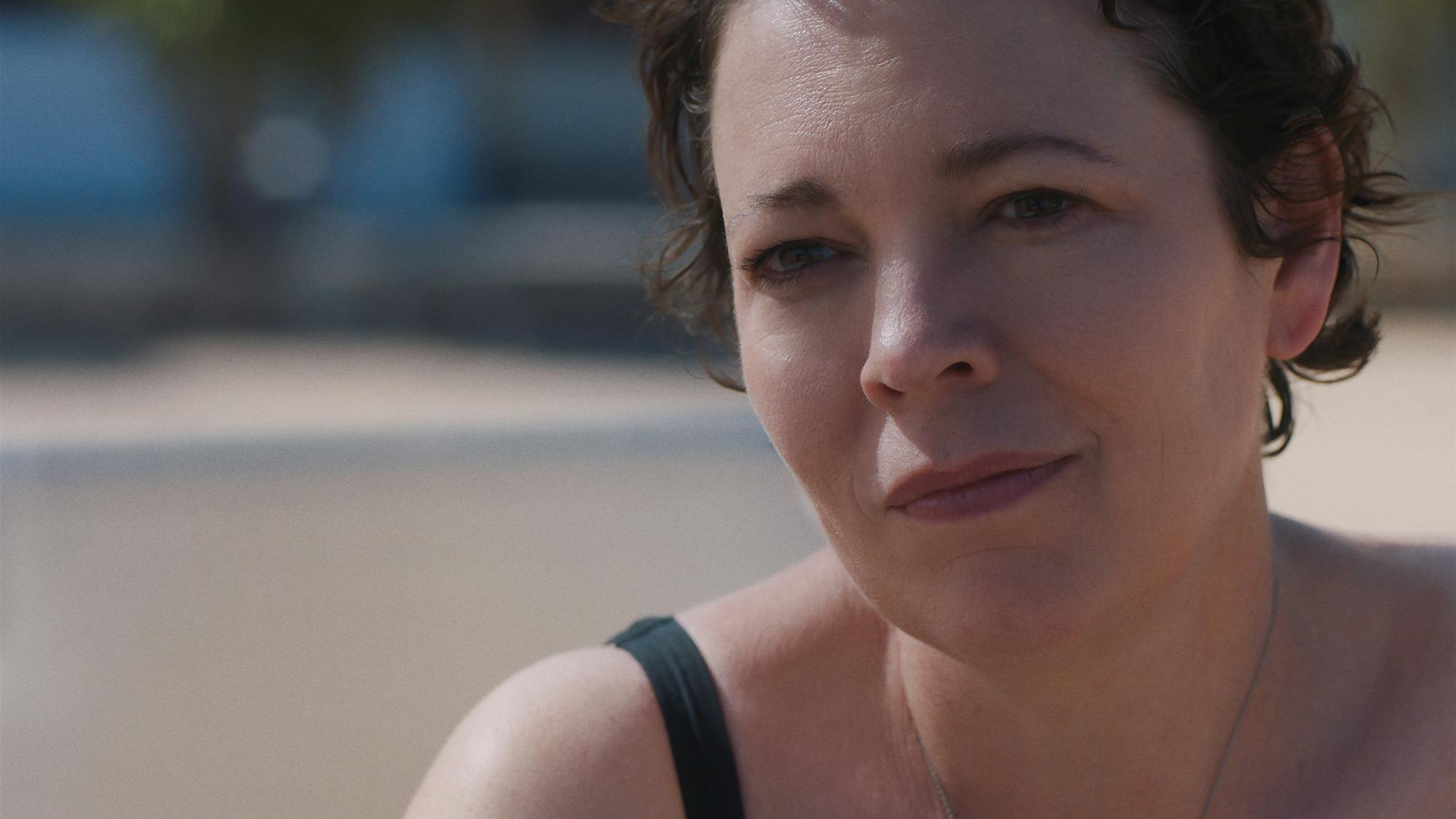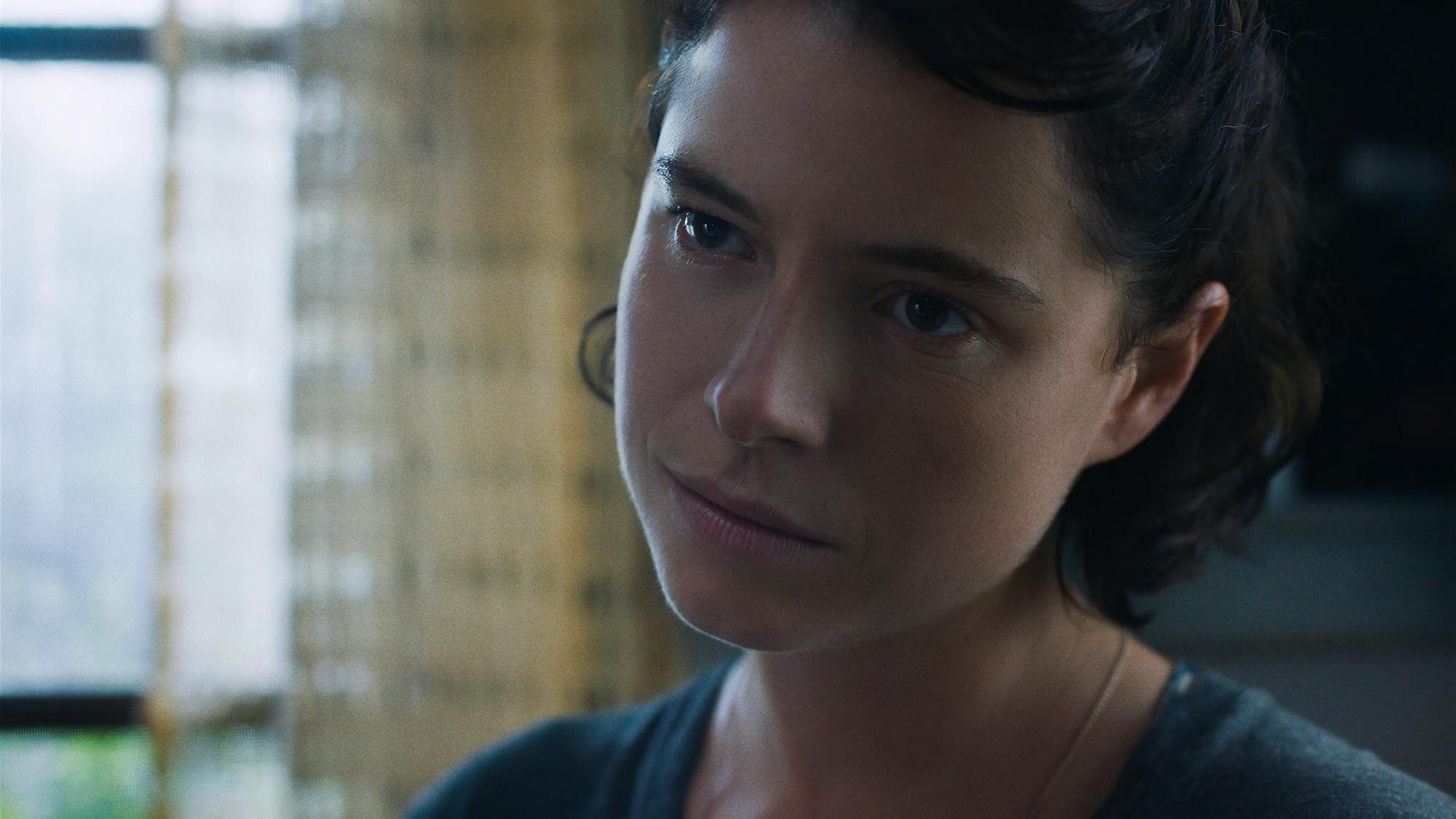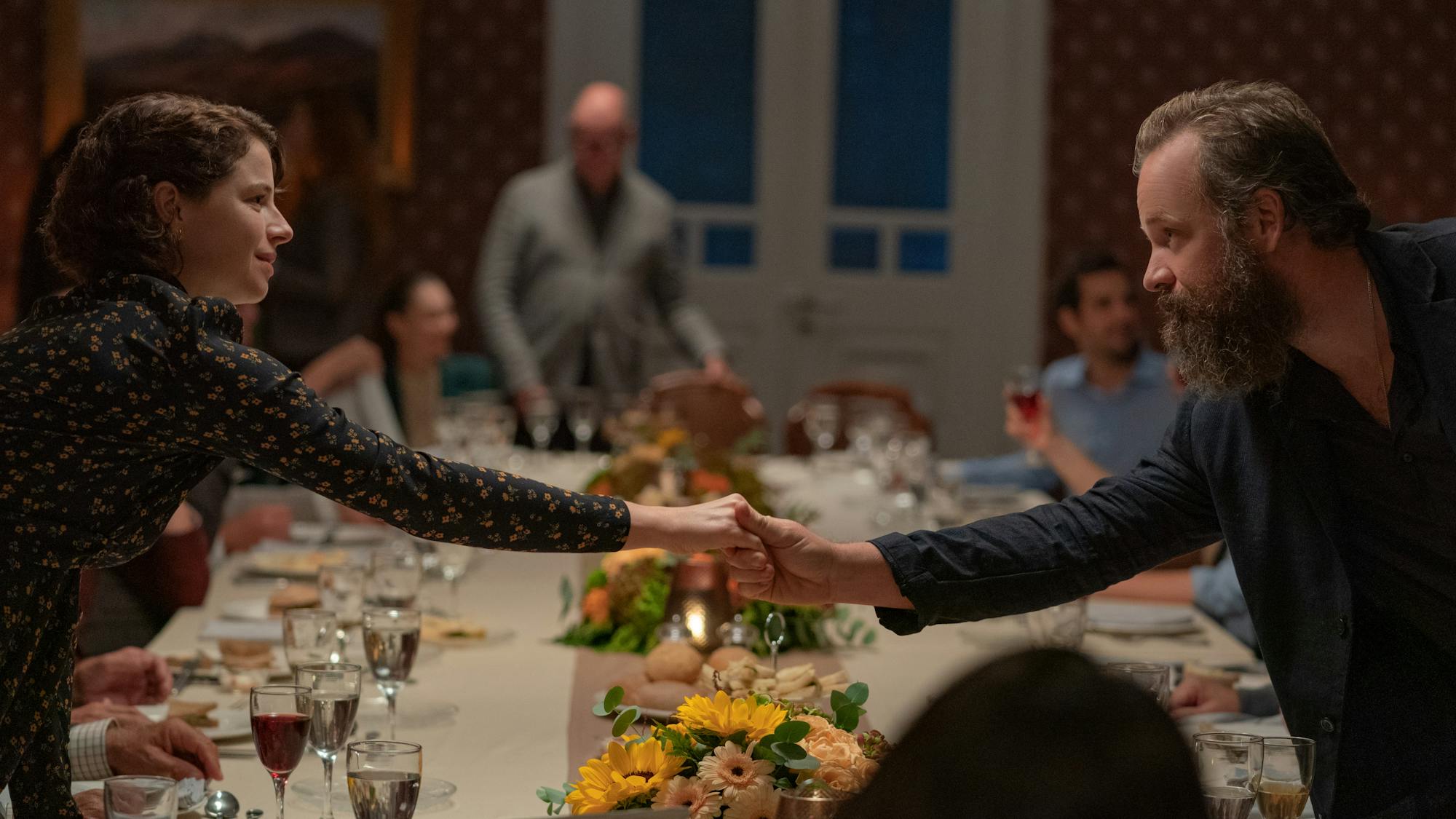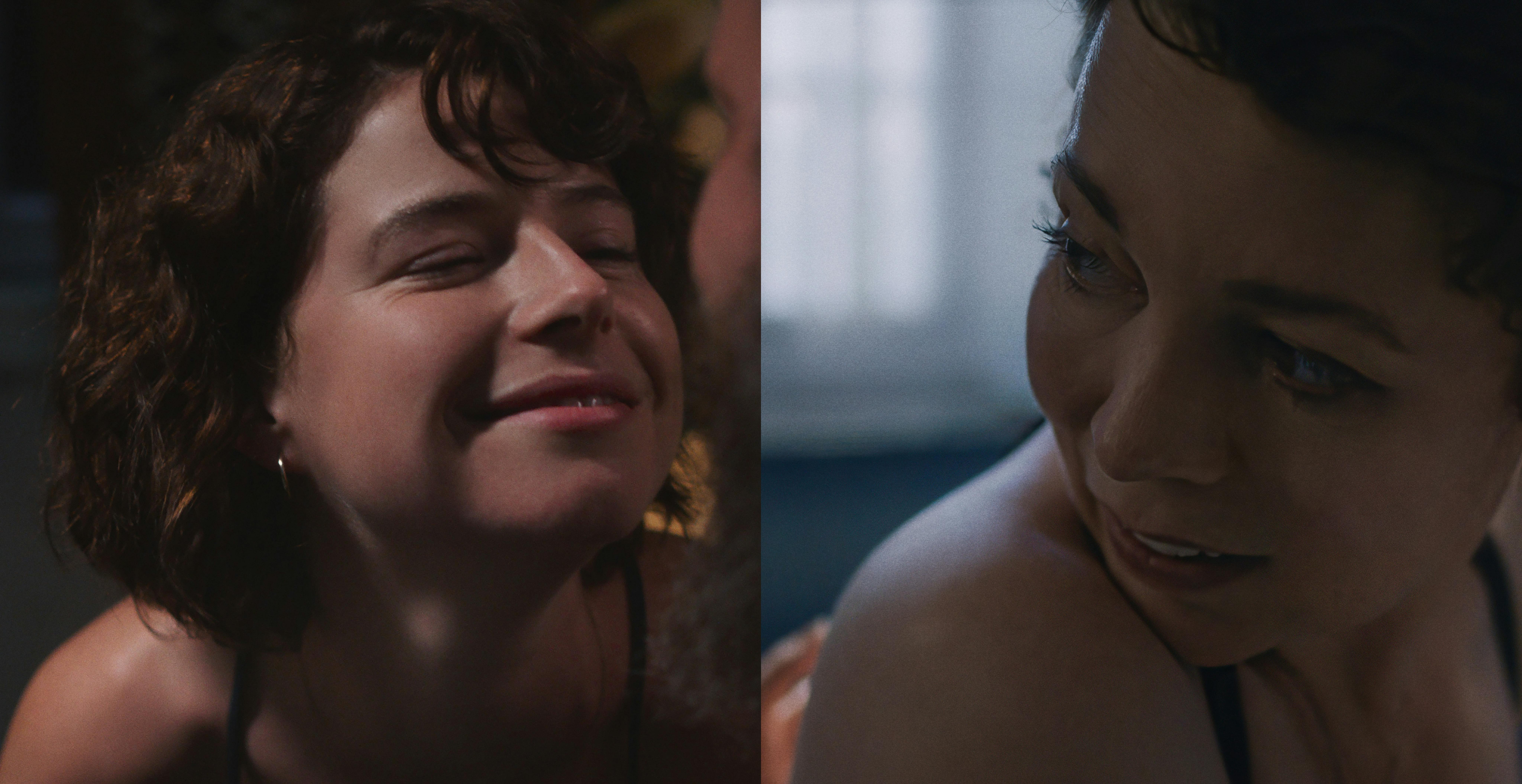The magnetic actors discuss their Oscar-nominated turns as Leda in The Lost Daughter.
In Maggie Gyllenhaal’s feature writing and directorial debut, The Lost Daughter, Olivia Colman (The Favourite, The Crown) and Jessie Buckley (Wild Rose, I’m Thinking of Ending Things) both play aloof literature professor Leda at different stages of her life — in present-day, Colman’s Leda encounters the young mother of a demanding child (Dakota Johnson) during a seaside holiday in Greece, prompting her to reflect on the difficult choices she made while parenting her own daughters many years earlier. In flashbacks, we see Buckley as Leda, struggling in real time to fulfill her professional and personal dreams while being confronted by overwhelming familial demands. In the end, she makes a controversial choice that forever alters the course of her life. “More than any other film I’ve done, I get texts from friends who want to talk about it or say, ‘I need to sit with this for a few days,’” says Colman. “I’m thrilled by the power of film — it’s something that really affects you and you can still think about it for days afterward.”
Since The Lost Daughter premiered at the Venice Film Festival in 2021, the elliptical drama, adapted from Elena Ferrante’s novel, has collected numerous accolades for its perceptive insights into the experience of motherhood. Now both Colman and Buckley have become only the third pair of actors to receive Oscar nominations for playing the same character in the same film. The gifted performers recently spoke about their collaboration, of which an edited portion of the conversation follows.

Olivia Colman
What was your reaction when you got the script? How did it come to you?
Olivia Colman: I heard Maggie wanted to meet me, and then she sent me the book or she sent me her script — I can’t remember which one came first. I went to meet Maggie in New York. We hit it off. We started with a very sensible lunch and then ended up having a glass of bubbles and had a lovely afternoon. I loved how Maggie had written it. During that lunch, she was saying, If you have any ideas about the young Leda . . . I said, I do actually. Do you know Jessie Buckley? She’s incredible. I feel pretty pleased with myself about that.
What then was your process as an actor, looking at that screenplay and getting to the essence of this character? She’s got so many layers to her.
OC: I just go with what’s written down. When it doesn’t work is when the script is lacking. That’s when it becomes difficult, but this, you give yourself to it, you say what is written. And if I was going off a bit, Maggie was so brilliant because she knows the feeling — she knows what to say and how to say it to get you back where you’re meant to be. It really was as simple as that. We trusted the script. It’s a roadmap, and you follow the roadmap.
Jessie, in looking at the younger version of this character, what stood out for you about this role?
Jessie Buckley: I recognized all the women in my life in it and the beautiful chaos and the honesty of it all. Some of it was really challenging and scary. At the same time, I felt like I was taking a big sigh of relief for not just myself as maybe a future mother and as a daughter, but for my own mother and my best girlfriends. I just hadn’t read something like that before. Also having somebody like Maggie be the leader of this made it a no-brainer because of the woman that she is. She imbues so much of what is honest and enabling and powerful about being a woman. I was so excited to be going on a journey with her.

Jessie Buckley
What did you make of young Leda? Did you make judgments about her?
JB: I just saw somebody who’s trying to find a way to live life fully. Even within Leda, she has her own judgments and her own fears and conflicts about what is the right way to be a mother. What is the right way to be a woman in the world? What is the right way to live a life when you’re hungry to be part of something bigger than the parameters that you’re given, once you become a mother? For me, she was never somebody who was a bad mother. I actually thought she was genuinely trying to cut a cord of being smaller because you become a mother — maybe the biggest gift you give to your daughters is not to narrow yourself to one part of yourself. The most amazing women in my life live with this conflict all the time.
OC: I agree with Jessie. She’s not a bad mother. She clearly loved her children. She was never cruel to her children, but she took a step that most people wouldn’t. That’s part of the genius of this book and this film is that everyone who watches it, whatever family you’ve come from or whatever situation you are in currently, it’s a great point of discussion. It does make you go, Could I do that? Would I?
What was it like working with Maggie? How did she help you with this role?
JB: She’s an incredible woman. I would’ve done anything for her genuinely because I believe she has the best, most honest, artistic intentions at heart. She set a tone, not just for us, but for the whole crew and for everybody who is part of it to A) have a really good time, and B) put their complete heart into it. You could feel that every day on set. It felt wild and anything could happen. If she’d like to work with me again, I’ll be very happy.
OC: Jessie has put it beautifully — she always does. There’s something about Maggie — Maggie has been building up to this for the last 20 years. She’s been on film sets. She’s seen how to do it, how not to do it, how she would love to be directed. You could do anything for her because you knew she’d done it before. She spoke to each of us in a slightly different language. I know that notes that she had for Jessie would never have worked for me. She had to work out, Okay, this is how to speak to you, and this is how to speak to you. I think Jessie had many more literary references and things [like that]. Maggie had to talk to me in a very different way, but it’s just a sign of her being born to this.

Jessie Buckley and Peter Sarsgaard
Jessie, in your scenes, you worked with very young actors. What was that like to be on set with them?
JB: Robyn [Elwell] and Ellie [Blake] — we were a little team. I love working with kids because there’s no way you can lie. You make up games basically all the time. Robin had acted before and Ellie hadn’t. Robin totally understood what was required of her, and, in an amazing big sister way — sometimes when Ellie would be tired or whatever — she would very gently invite her into the scene, and then we’d find ourselves in there. It was so easy to love them as a mother on that job because they were completely gorgeous.
Olivia, you shot this in Greece, not a bad place to go. What was it like being in that location?
OC: We kept pinching ourselves. We were very aware that the world was in the middle of the most extraordinary turmoil, and the whole island was a bubble, really. As far as I know, there weren’t any cases at all on the island when we were there. We all wore masks while we were filming. We had to do all the protocols and everything. But when we had a big scene, all the islanders were our background artists, and then, on wrap, you could swim in that beautiful sea. There were no cars. We cycled to work. It was idyllic.
Olivia, you have so many interesting scenes where there isn’t dialogue — on the beach when you first encounter Dakota Johnson’s character, the language that we’re seeing without words tells us everything.
OC: My dream is to play a part with no lines at all because it’s the challenge — if you can get it all across and if people understand what you’re doing. Can you get the point across without cheating and using words? Dakota is terribly eloquent about [how] two women can have a million conversations looking at each other and that's what we've always done. She’s such a clever thing. I loved that chance where we’d have a little whisper of maybe what we’re thinking — and to let it keep rolling and to not chicken out as well. It’s just fun.
